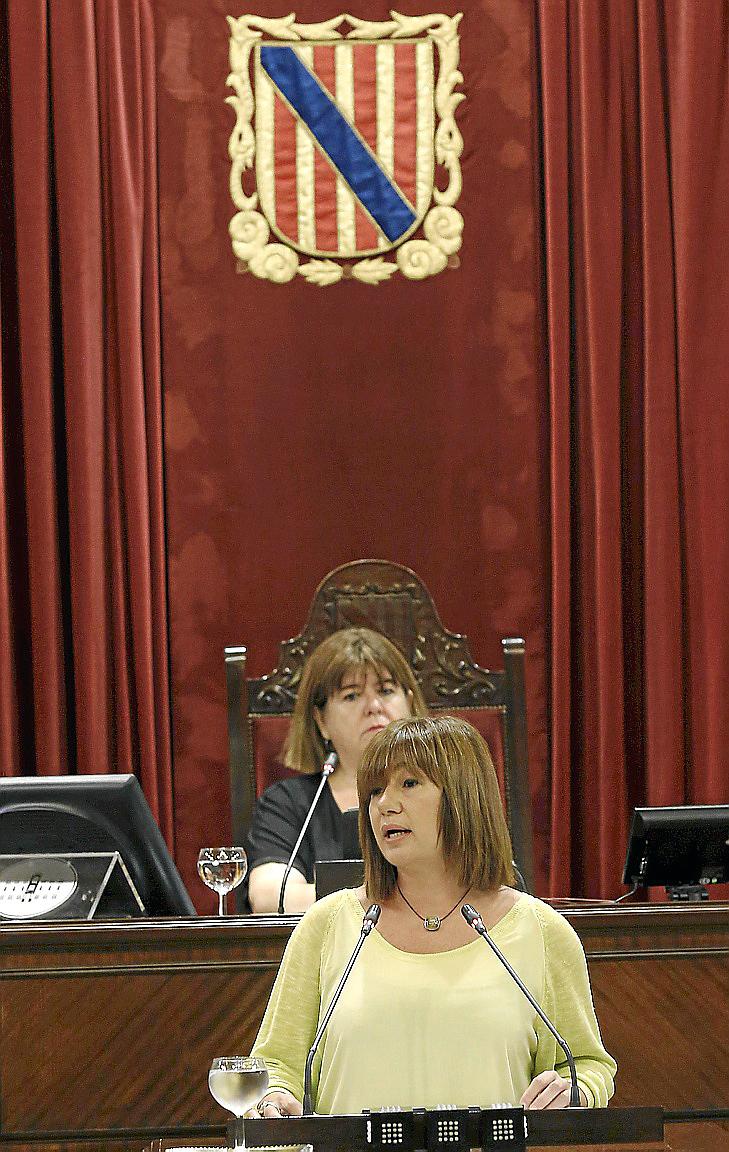Francina Armengol, who is expected to be ratified as president of the Balearics today, said yesterday during the investiture debate that there would be a tourist tax.In addition, she has promised a moratorium on large retail outlets, federalism for the Balearics and a repeal of TIL (Tratamiento Integrado de Lenguas, trilingual teaching).
During her speech, which lasted around 45 minutes, she spoke of having a “mandate to work to rescue the citizenship and politics”, underlining this by saying she is “a citizen” more than she forms part of a clamour for change.
One of the first decisions of her government would be those related to tackling poverty and social exclusion. With this in mind, the “20,000 health cards” that were taken away from illegal immigrants by the previous administration will be returned. She also referred to the harm caused by unemployment and the loss of social welfare.
“A society which creates poor citizens is shameful. A progressive government cannot permit this.” The new government will also, she added, implement a basic income for all people regardless of whether they are in employment as well as a plan to halt evictions.
Among other immediate priorities are the repeal of TIL and of the Law of Symbols (the one under which flying the Catalan flag on public buildings was banned). Education featured strongly in her speech, and she announced that the Consulat de la Mar (the headquarters of the president) would be “your home”, i.e. for the teachers, in what was an allusion to the lack of communication that existed between the last administration and the teachers.
The decree through which TIL was implemented caused, she noted, one of the biggest demonstrations ever witnessed in the Balearics.
She also indicated that new employment opportunities could exist through further development of education for very young children, i.e. up to three years of age.
With regard to relationships with central government and the state, she said that she was in favour of Spain soon becoming a federal state (something that the leader of PSOE nationally, Pedro Sanchez, has called for) and that she also wanted there to be a federal model for the Balearic Islands. As for the system of financing for the Balearics from central government, she said that she will seek a meeting with Prime Minister Mariano Rajoy in order to “paralyse a special regime made behind the backs of society” (a reference to the arrangements that Rajoy and President Bauzá arrived at but which were considered to be beneficial for only some interests in the Balearics).
Further to the idea of a federal model within the Balearics, she said that there will be a meeting with the presidents of the island councils in order to design a model of responsibilities and of improved financing.
Spain, she observed, is at a time of social, political and democratic change, and so a change to how the Balearics is governed had to reflect this.
A move to island federalism would be one recognised by the Balearic Statute of Autonomy to strengthen the roles of the island councils as the principal institutions of self-government.
On the creation of a tourist tax, she said that its purpose would be for reinvestment in the sector and also make the Balearics more sustainable, something which should not just be a claim but an obligation.
Indirectly on tourism, she spoke of the need to empower industry and medium-sized business in the Balearics, where there is otherwise so much emphasis on tourism.
There has to be a plan “to improve the industrial map” of the islands.


No comments
To be able to write a comment, you have to be registered and logged in
Currently there are no comments.